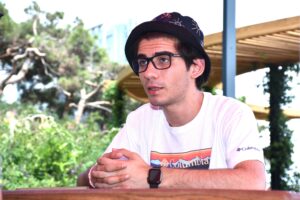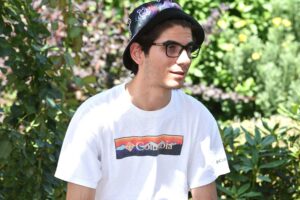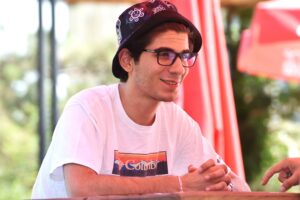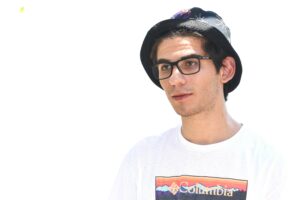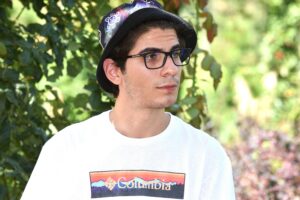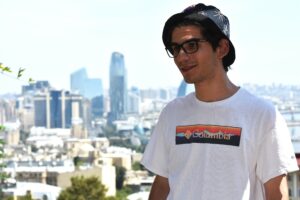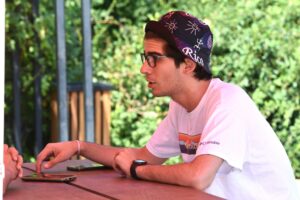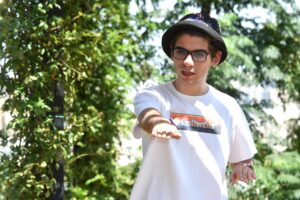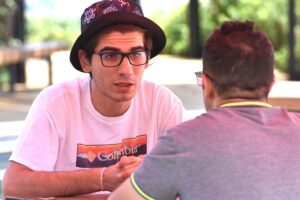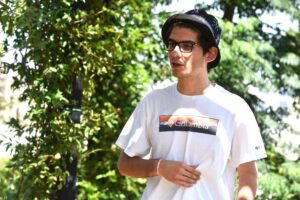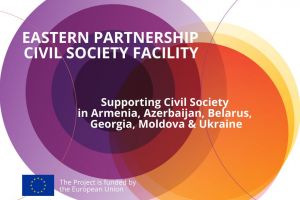
KekaMaps project in Azerbaijan: how to adapt urban infrastructure for people with disabilities
Narrow pavements, traffic jams, crowded public transport… this is Baku – a situation that we encounter and experience every day and that most cannot avoid.
This situation makes life especially difficult for people with disabilities. Today in Baku, a person with a disability cannot access any rehabilitation centre, public or government institution without someone’s help. There are no ramps on the streets, no elevators or lifts in the metro, no appropriate conditions for people with disabilities in public buildings or government institutions they want to visit. Most people know and see this problem, but many also ignore it.
Mahammad Kekalov is one of the few people who wants to contribute to their solution. He was born in Zagatala in North-Western Azerbaijan, and grew up under the care of his visually impaired grandmother. Later, while studying in the United States, he saw how people with disabilities were treated there. Now he is making efforts to ensure greater participation of people with disabilities in his society and to attract public attention to the daily problems they face. He is also working to solve infrastructure issues that they encounter at work and in everyday life.
Mahammad developed the ‘Accelerating KekaMaps.com’ project to ensure that people with disabilities have access to fundamental human rights through innovative technologies and transparent solutions. In 2021, he developed Kekamaps.com within the adaptation sprint programme of the EU-funded Eastern Partnership Civil Society Facility, and then accelerated it in 2022 with the additional funding he received as an Eastern Partnership Civic Digital Fellow.
The Eastern Partnership Civil Society Facility, funded by the EU, contributes to strengthening the role and capacity of civil society and activists in the six Eastern Partnership countries (Armenia, Azerbaijan, Belarus, Georgia, Moldova, and Ukraine). Mahammad Kekalov is one of 120 civil society activists participating in the fellowship programme under this project. The main goal of the project is to increase the capacity of civil society organisations and activists to participate in the development of new legislation and policy in their countries.
What is KekaMaps?
Anyone who uses the Kekamaps.com application while walking or on the way to work can mark locations that are not suitable for people with disabilities. The relevant location is photographed, the deficiency is indicated and sent to the system with the address. Mahammad and his team then use this data to conduct evidence-based community action to advocate for the rights of people with disabilities. The project is financially supported by the European Union. It is inspired by the Ukrainian platform Provodnik.online and adapted to the situation in Azerbaijan. Using the platform, Mahammad and his team of volunteers have walked more than 100 kilometres over the past two years and marked thousands of buildings that do not have adequate facilities for disabled people.
“There is a corresponding decision of the Cabinet of Ministers that local executive bodies in the territories under their jurisdiction must make sure that all buildings, including private property, facilities and government institutions, with the exception of residential buildings, are suitable for people with disabilities,” says Mahammad.
However, he notes with regret, executive authorities do not really supervise the infrastructure, and if they do, it is merely formal.
“Starting from 2021, we have been monitoring the infrastructure in Azerbaijan, conducting constant negotiations with local executive authorities, the Ombudsman’s Office, and the Cabinet of Ministers to resolve these issues. We want to draw their attention to this problem,” noted Mahammad.
According to official statistics, there are more than half a million people with disabilities in Azerbaijan. Some of them live in the capital, but even there the construction of most buildings does not take into account the needs of people with disabilities. In these circumstances, for many people with disabilities, simply being at home is like being locked in a small prison.
Mahammad says the issue is even more critical in the wake of the ‘44-day war’ (between Armenia and Azerbaijan in autumn 2020), as a result of which even more people have to live with disabilities, but want to take an active part in society.
In recent years, developments in technology, as well as positive changes in attitudes towards disability and a more inclusive approach among younger generations have contributed to increasing activity and opportunities for people with disabilities.
Mahammad says the institutions they contact sometimes fob them off with a standard, formal response that shows little care. However, he believes that officials working in government institutions should show empathy for people with disabilities and a desire to solve their problems.
“The reaction from private entities is also very negative. Sometimes when we want to assess whether the infrastructure of a particular restaurant is suitable for people with disabilities, we were not allowed to do so,” Mahammad said.
He argues that in order to create a proper infrastructure for people with disabilities, there has to be legislation that will impose an administrative penalty if there is no access to a place.
“Today, the legislation of Azerbaijan has, to a certain extent, been brought into line with the UN Convention on the Rights of Persons with Disabilities. Azerbaijan has adopted very progressive decisions arising from the requirements of this convention, but unfortunately, they are not being implemented,” says Mahammad.
About 200 people with disabilities and about 40–50 volunteers take part in the projects implemented by Mahammad. He said that in September he plans to introduce several innovations on the website, increase the number of volunteers and even create a network of volunteers who want to take part in solving problems faced by people with disabilities: “Currently, KekaMaps is at its second version. For the third version we plan to add more functionality. Basically, we want to turn this app into a game so that people can play it and have a better time and simultaneously do something useful for people with disabilities.”
Mahammad’s plans include launching KekaMaps in Uzbekistan and promoting it as an Azerbaijani brand and civil society innovation.
Although Mahammad has currently succeeded in adapting only one building for people with disabilities, he does not give up and continues to work in this direction. If today he has succeeded in one building, tomorrow there could be up to 100 of them. And one day the entire city will be adapted for inclusive living, he believes.
Author: Chingiz Safarli
Article published in Azerbaijani and Russian by Apa.az, Vesti.az and Lent.az
MOST READ
RELATED PROJECTS
SEE ALSO

No, time is not on Russia‘s side
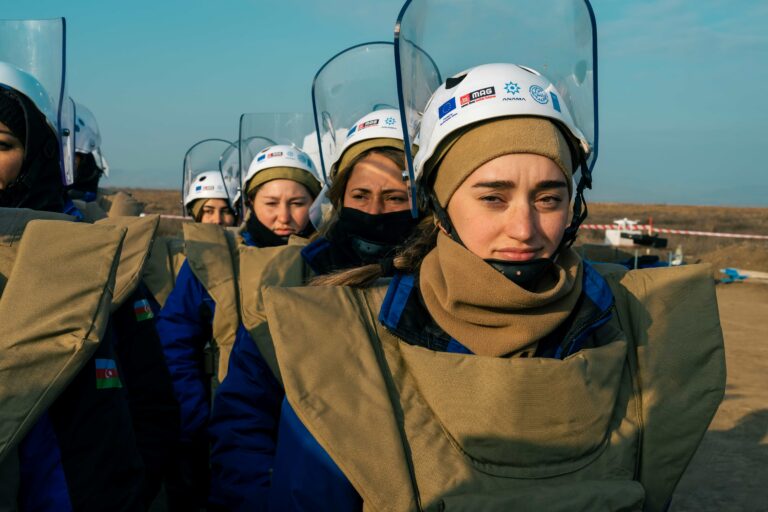
I have no regrets: the Azerbaijani women trained to clear mines
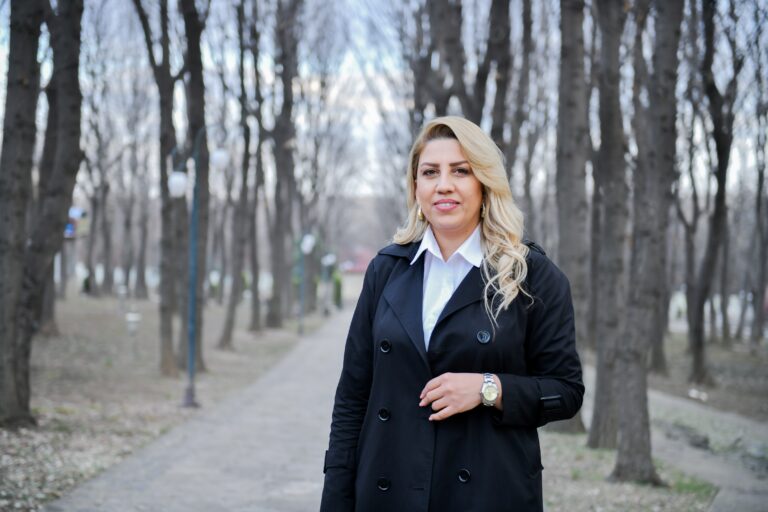
Turning a hobby into business: how Vusala Akhmadova from Tovuz helps women and children develop

Be one step ahead of a hacker: check simple cybersecurity tips!
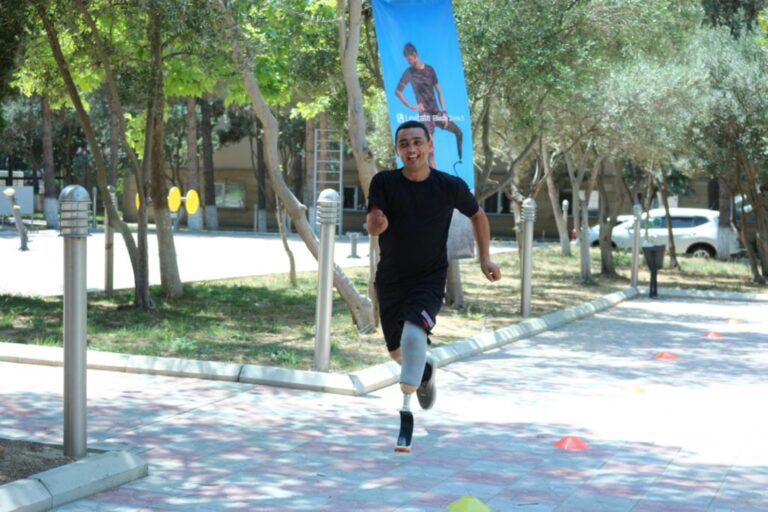
A chance for a better life: restoring justice for people with disabilities in Azerbaijan
More campaign pages:
Interested in the latest news and opportunities?
This website is managed by the EU-funded Regional Communication Programme for the Eastern Neighbourhood ('EU NEIGHBOURS east’), which complements and supports the communication of the Delegations of the European Union in the Eastern partner countries, and works under the guidance of the European Commission’s Directorate-General for Neighbourhood Policy and Enlargement Negotiations, and the European External Action Service. EU NEIGHBOURS east is implemented by a GOPA PACE-led consortium. It is part of the larger Neighbourhood Communication Programme (2020-2024) for the EU's Eastern and Southern Neighbourhood, which also includes 'EU NEIGHBOURS south’ project that runs the EU Neighbours portal.

The information on this site is subject to a Disclaimer and Protection of personal data. © European Union,
